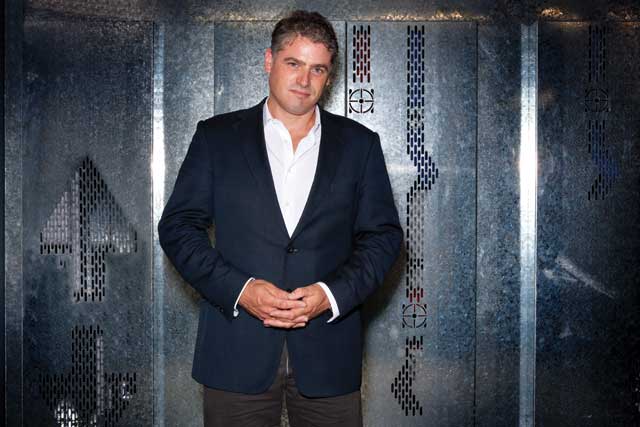This week, we're marking our tenth year in business, and a number of people who have supported Albion along the way said: "Don't forget to reflect for a minute."
The constant at Albion has been entrepreneurialism: ten years of working with start-ups, growing brands from scratch, working with seminal founders and watching our own business evolve from just two of us in a tiny shop front on Great Eastern Street to our 70-person home at the Tea Building. Our most important moments have been mirrored by the growth and expansion of the East London tech cluster. This has always been our home. Being recognised by Wired in its original piece that popularised the phrase "Silicon Roundabout" was special, but what keeps us in a state of constant change is the regular knock on the door by serious entrepreneurs looking for a creative business partner.
My previous boss at DDB, Chris Powell, always said "you are only as good as your clients", and having great entrepreneurs as our centre of gravity has made us different and every year better at what we do. The original recipe put digital at the heart of our strategic approach but, since then, we've addressed the crucial role of strong branding, the ability to tell the story in 30 seconds of film, the importance of earned media with our social capability, the acquisition engine of performance marketing, and the rise and rise of user experience and product design.
Entrepreneurs need to know you are completely vested in their business. The often ferocious pace of the business environment and our constant sense of being in start-up mode is definitely driven by them.
I got my first taste of this in 1996 when I co-founded BMP interAction (which later I "pivoted" into Tribal DDB in 1998). I loved that feeling that digital was going to fundamentally disrupt the way we did things. I started working with new types of clients such as the Demon Internet founder Cliff Stanford, and quickly learnt how businesses could be created out of nothing other than the combination of a strong zeitgeist idea, momentum and enormous conviction. Some of the establishment at DDB would tell me: "These entrepreneurs ... they'll never pay their bills ... they are uncontrollable." So, despite the growth and success of Tribal, I got worn out battling with the question of why the old advertising way couldn't be integrated with the new digital approach. After learning a lot, in 2002, I left to start something from scratch.
The original Albion line-up was two people I'd worked with previously at DDB but who'd moved on before me. For totally understandable (but, at the time, incredibly frustrating) reasons, they both dropped out the month before 北京赛车pk10 gave us a small "launch announcement" column on its front page. This is the way with a start-up - never a dull moment. I ended up starting in what is now known as a bootstrapped way - a small, fluid team, cheap rent, low or no salaries, walking to work. The need to keep costs low, and the desire to be different, led us to run-down East London and Shoreditch.
Within the first few years, Richard Reed from Innocent, Alex Dale at Virgin.net, Saul Klein from what would become LoveFilm, Niklas Zennstrom and Janus Friis at Skype all walked through the door and taught us what founders expect from a creative partner. All were in their infancy as businesses and we helped create the foundations of how they did marketing and built their brand culture. Skype would go on to become, still to this day, the biggest exit of any European start-up when it sold to eBay for $2.6 billion and then to Microsoft for $8.5 billion. This exit kick-started a focus on tech start-ups right across Europe, and many of their early employees who we worked with are the generation of new founders coming through in the past year. On the back of this, we went on to work with eBay, Last.fm, Betfair, Funding Circle, Justgiving and Wonga, and teaching big business how to do "start-up" with Air New Zealand, Giffgaff, Unum, Aviva's Quotemehappy and Jose Cuervo.
One of the right things we did was to work closely with the private-equity scene and understand the way venture-capitalists invest in entrepreneurs. They taught us about start-up business strategy, the importance of momentum, simultaneous focus on a vision for the future and delivery today, and getting into the next thing early. We were integrated and digital from the start, but as a result of the VC view of the world, we got into social early (with a Facebook campaign for Skype in 2006). And that world has grown exponentially in terms of its importance to our clients.
From the VCs, we also learned about venture marketing and, still to this day, we may take shares in our clients' companies instead of traditional fees. This practice, though risky to some, showed us how to be seriously invested in a start-up's vision and to really believe in the work we're doing for them. Creating genuine business partnerships, in which risk is shared, is a core value to how we operate.
But I can't pretend we didn't learn at least some of these lessons the hard way. Doing anything international is insanely hard and building our West Coast business will take a lot more effort before we can call it a success. What would I have done differently? Not much. The team we've built is brilliant and the work gets better and better but, looking back, I would have pushed harder to have taken equity instead of fees from Skype.
Jason Goodman is the founder and chief executive of Albion.


